Physician-Assisted Suicide: A Philosophical and Ethical Examination
VerifiedAdded on 2022/10/19
|12
|2845
|486
Essay
AI Summary
This essay presents a formal argument on the ethical permissibility of physician-assisted suicide, framed within the context of a philosophy course. It begins by defining physician-assisted suicide and acknowledging the ongoing debate surrounding its legality. The essay then explores the application of two major ethical theories: virtue ethics and utilitarianism. Virtue ethics is examined in terms of the character and motivations of individuals involved, while utilitarianism is considered through the lens of both rule and act utilitarianism, evaluating the consequences of physician-assisted suicide. The essay considers the pros and cons of each ethical framework, analyzing how they support or challenge the practice. The author synthesizes the arguments to provide a conclusion on the justifiability of physician-assisted suicide based on the ethical theories presented. The essay makes use of course resources and scholarly sources to support its arguments, aiming to provide a comprehensive analysis of the ethical complexities involved.
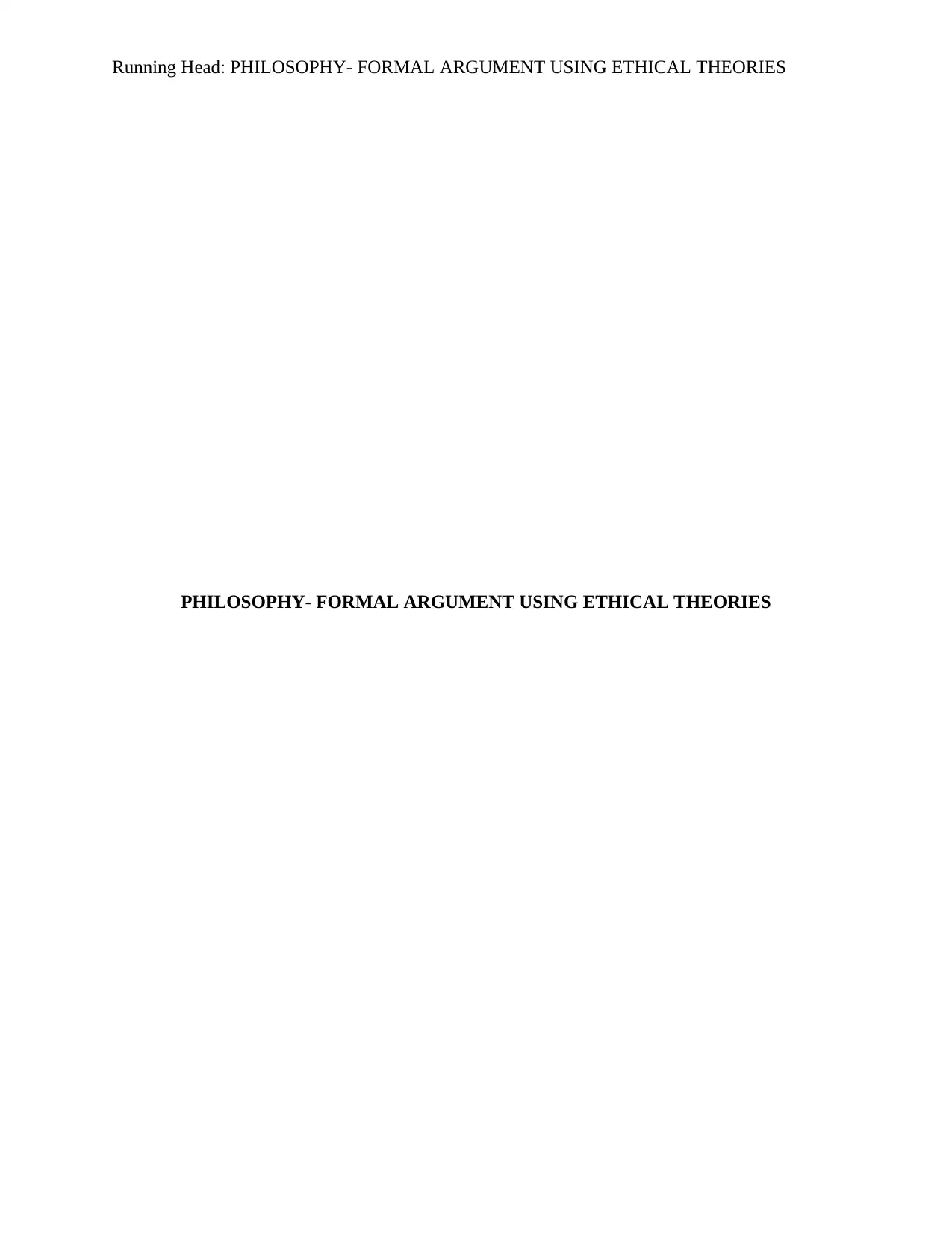
Running Head: PHILOSOPHY- FORMAL ARGUMENT USING ETHICAL THEORIES
PHILOSOPHY- FORMAL ARGUMENT USING ETHICAL THEORIES
PHILOSOPHY- FORMAL ARGUMENT USING ETHICAL THEORIES
Paraphrase This Document
Need a fresh take? Get an instant paraphrase of this document with our AI Paraphraser
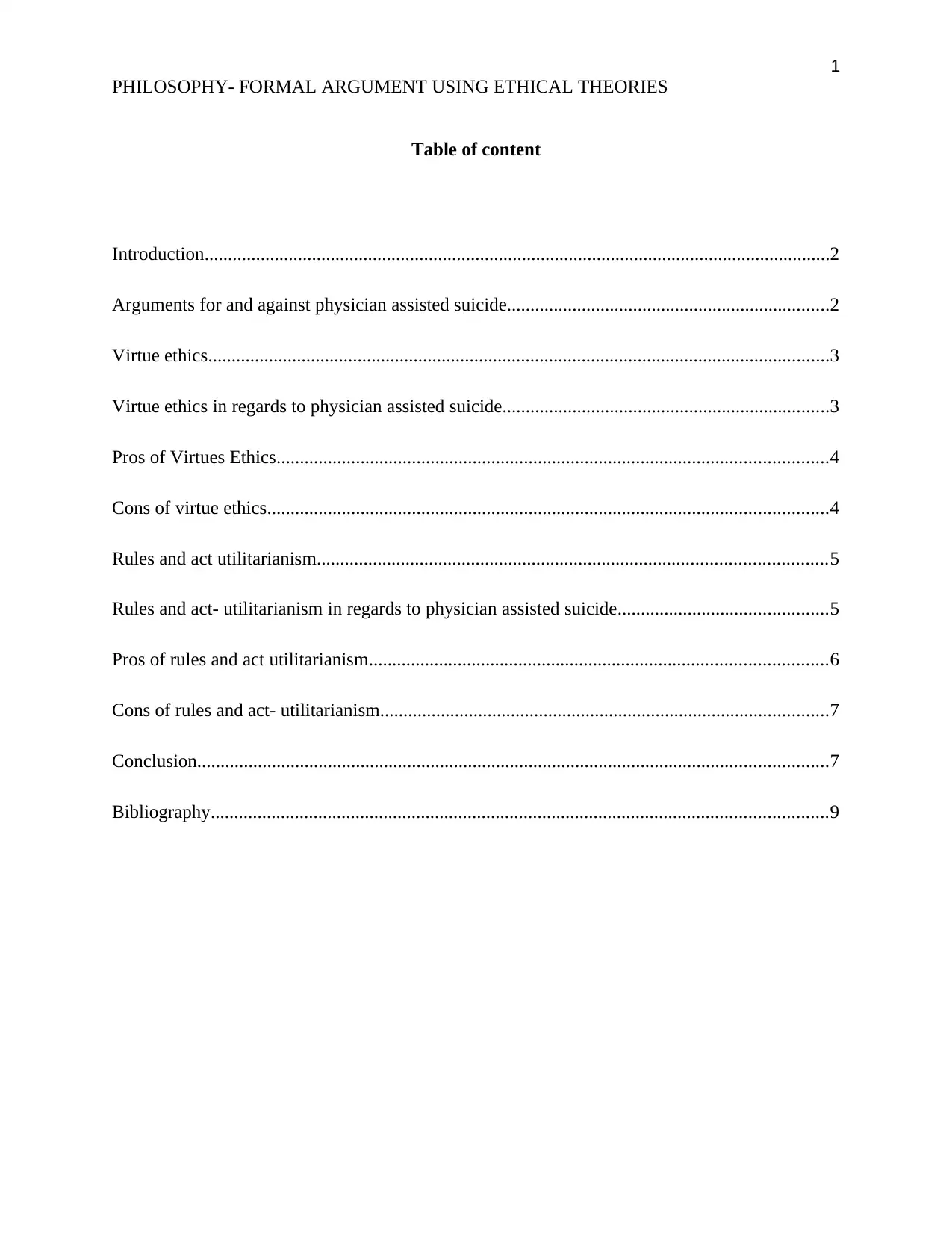
1
PHILOSOPHY- FORMAL ARGUMENT USING ETHICAL THEORIES
Table of content
Introduction......................................................................................................................................2
Arguments for and against physician assisted suicide.....................................................................2
Virtue ethics.....................................................................................................................................3
Virtue ethics in regards to physician assisted suicide......................................................................3
Pros of Virtues Ethics......................................................................................................................4
Cons of virtue ethics........................................................................................................................4
Rules and act utilitarianism.............................................................................................................5
Rules and act- utilitarianism in regards to physician assisted suicide.............................................5
Pros of rules and act utilitarianism..................................................................................................6
Cons of rules and act- utilitarianism................................................................................................7
Conclusion.......................................................................................................................................7
Bibliography....................................................................................................................................9
PHILOSOPHY- FORMAL ARGUMENT USING ETHICAL THEORIES
Table of content
Introduction......................................................................................................................................2
Arguments for and against physician assisted suicide.....................................................................2
Virtue ethics.....................................................................................................................................3
Virtue ethics in regards to physician assisted suicide......................................................................3
Pros of Virtues Ethics......................................................................................................................4
Cons of virtue ethics........................................................................................................................4
Rules and act utilitarianism.............................................................................................................5
Rules and act- utilitarianism in regards to physician assisted suicide.............................................5
Pros of rules and act utilitarianism..................................................................................................6
Cons of rules and act- utilitarianism................................................................................................7
Conclusion.......................................................................................................................................7
Bibliography....................................................................................................................................9
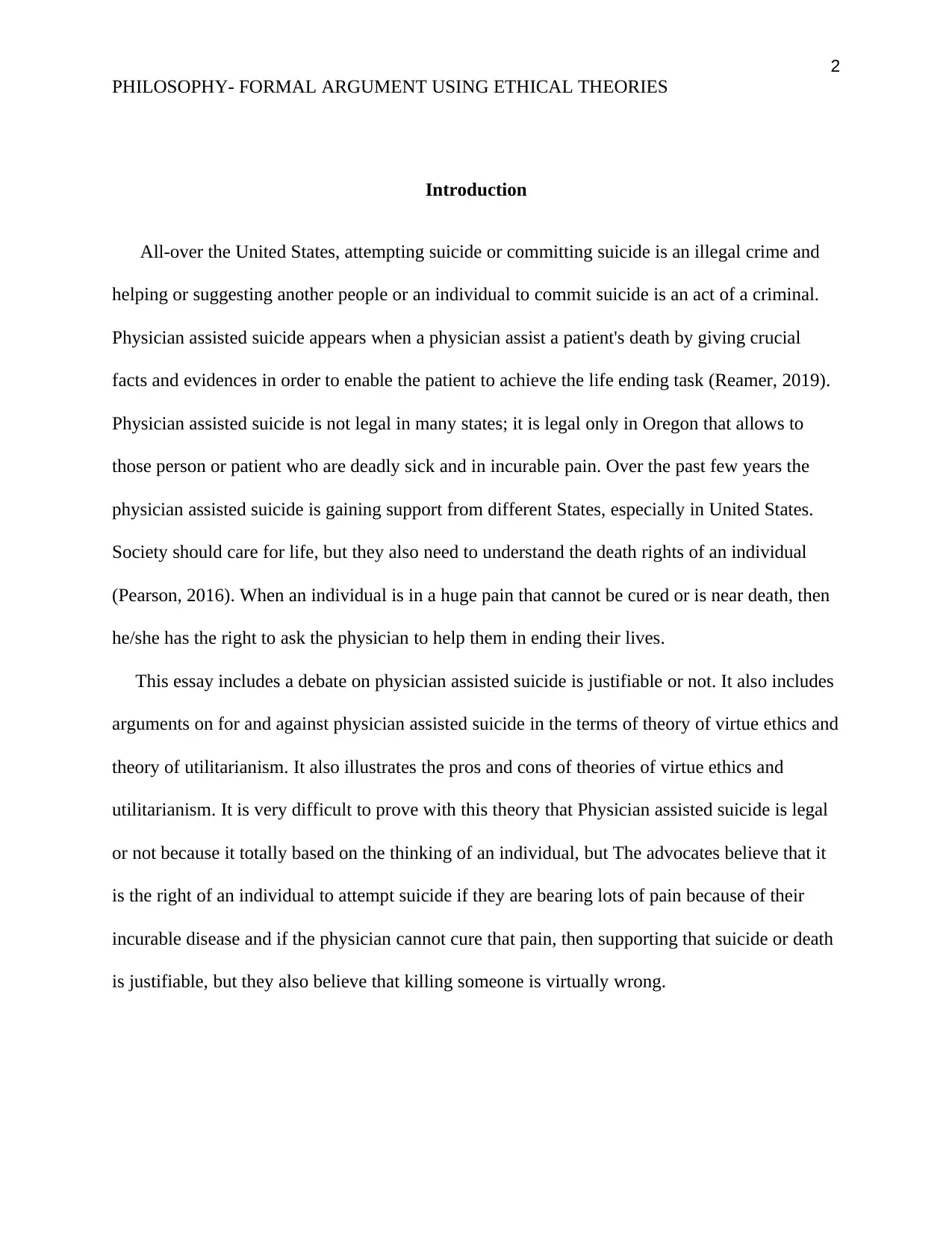
2
PHILOSOPHY- FORMAL ARGUMENT USING ETHICAL THEORIES
Introduction
All-over the United States, attempting suicide or committing suicide is an illegal crime and
helping or suggesting another people or an individual to commit suicide is an act of a criminal.
Physician assisted suicide appears when a physician assist a patient's death by giving crucial
facts and evidences in order to enable the patient to achieve the life ending task (Reamer, 2019).
Physician assisted suicide is not legal in many states; it is legal only in Oregon that allows to
those person or patient who are deadly sick and in incurable pain. Over the past few years the
physician assisted suicide is gaining support from different States, especially in United States.
Society should care for life, but they also need to understand the death rights of an individual
(Pearson, 2016). When an individual is in a huge pain that cannot be cured or is near death, then
he/she has the right to ask the physician to help them in ending their lives.
This essay includes a debate on physician assisted suicide is justifiable or not. It also includes
arguments on for and against physician assisted suicide in the terms of theory of virtue ethics and
theory of utilitarianism. It also illustrates the pros and cons of theories of virtue ethics and
utilitarianism. It is very difficult to prove with this theory that Physician assisted suicide is legal
or not because it totally based on the thinking of an individual, but The advocates believe that it
is the right of an individual to attempt suicide if they are bearing lots of pain because of their
incurable disease and if the physician cannot cure that pain, then supporting that suicide or death
is justifiable, but they also believe that killing someone is virtually wrong.
PHILOSOPHY- FORMAL ARGUMENT USING ETHICAL THEORIES
Introduction
All-over the United States, attempting suicide or committing suicide is an illegal crime and
helping or suggesting another people or an individual to commit suicide is an act of a criminal.
Physician assisted suicide appears when a physician assist a patient's death by giving crucial
facts and evidences in order to enable the patient to achieve the life ending task (Reamer, 2019).
Physician assisted suicide is not legal in many states; it is legal only in Oregon that allows to
those person or patient who are deadly sick and in incurable pain. Over the past few years the
physician assisted suicide is gaining support from different States, especially in United States.
Society should care for life, but they also need to understand the death rights of an individual
(Pearson, 2016). When an individual is in a huge pain that cannot be cured or is near death, then
he/she has the right to ask the physician to help them in ending their lives.
This essay includes a debate on physician assisted suicide is justifiable or not. It also includes
arguments on for and against physician assisted suicide in the terms of theory of virtue ethics and
theory of utilitarianism. It also illustrates the pros and cons of theories of virtue ethics and
utilitarianism. It is very difficult to prove with this theory that Physician assisted suicide is legal
or not because it totally based on the thinking of an individual, but The advocates believe that it
is the right of an individual to attempt suicide if they are bearing lots of pain because of their
incurable disease and if the physician cannot cure that pain, then supporting that suicide or death
is justifiable, but they also believe that killing someone is virtually wrong.
⊘ This is a preview!⊘
Do you want full access?
Subscribe today to unlock all pages.

Trusted by 1+ million students worldwide
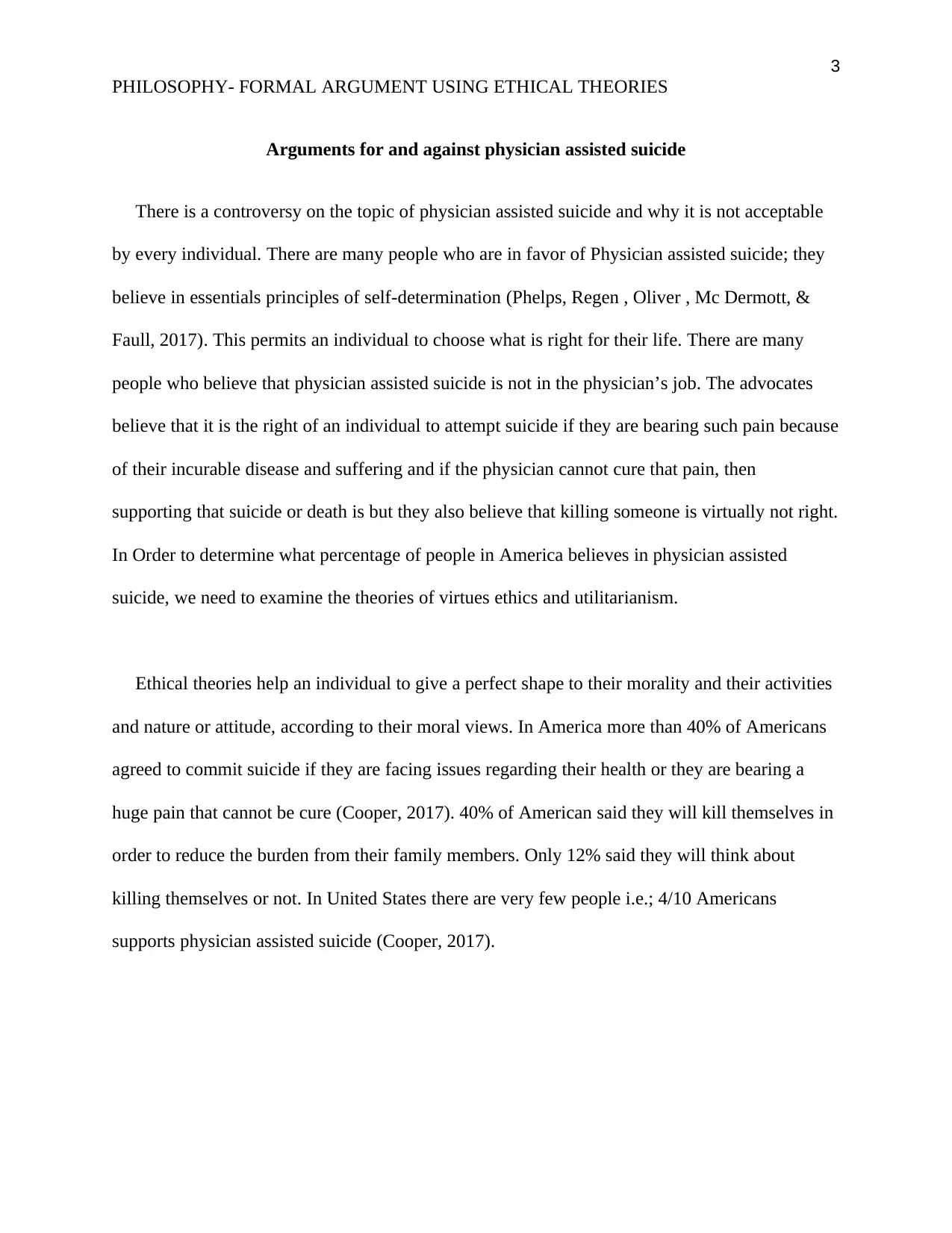
3
PHILOSOPHY- FORMAL ARGUMENT USING ETHICAL THEORIES
Arguments for and against physician assisted suicide
There is a controversy on the topic of physician assisted suicide and why it is not acceptable
by every individual. There are many people who are in favor of Physician assisted suicide; they
believe in essentials principles of self-determination (Phelps, Regen , Oliver , Mc Dermott, &
Faull, 2017). This permits an individual to choose what is right for their life. There are many
people who believe that physician assisted suicide is not in the physician’s job. The advocates
believe that it is the right of an individual to attempt suicide if they are bearing such pain because
of their incurable disease and suffering and if the physician cannot cure that pain, then
supporting that suicide or death is but they also believe that killing someone is virtually not right.
In Order to determine what percentage of people in America believes in physician assisted
suicide, we need to examine the theories of virtues ethics and utilitarianism.
Ethical theories help an individual to give a perfect shape to their morality and their activities
and nature or attitude, according to their moral views. In America more than 40% of Americans
agreed to commit suicide if they are facing issues regarding their health or they are bearing a
huge pain that cannot be cure (Cooper, 2017). 40% of American said they will kill themselves in
order to reduce the burden from their family members. Only 12% said they will think about
killing themselves or not. In United States there are very few people i.e.; 4/10 Americans
supports physician assisted suicide (Cooper, 2017).
PHILOSOPHY- FORMAL ARGUMENT USING ETHICAL THEORIES
Arguments for and against physician assisted suicide
There is a controversy on the topic of physician assisted suicide and why it is not acceptable
by every individual. There are many people who are in favor of Physician assisted suicide; they
believe in essentials principles of self-determination (Phelps, Regen , Oliver , Mc Dermott, &
Faull, 2017). This permits an individual to choose what is right for their life. There are many
people who believe that physician assisted suicide is not in the physician’s job. The advocates
believe that it is the right of an individual to attempt suicide if they are bearing such pain because
of their incurable disease and suffering and if the physician cannot cure that pain, then
supporting that suicide or death is but they also believe that killing someone is virtually not right.
In Order to determine what percentage of people in America believes in physician assisted
suicide, we need to examine the theories of virtues ethics and utilitarianism.
Ethical theories help an individual to give a perfect shape to their morality and their activities
and nature or attitude, according to their moral views. In America more than 40% of Americans
agreed to commit suicide if they are facing issues regarding their health or they are bearing a
huge pain that cannot be cure (Cooper, 2017). 40% of American said they will kill themselves in
order to reduce the burden from their family members. Only 12% said they will think about
killing themselves or not. In United States there are very few people i.e.; 4/10 Americans
supports physician assisted suicide (Cooper, 2017).
Paraphrase This Document
Need a fresh take? Get an instant paraphrase of this document with our AI Paraphraser
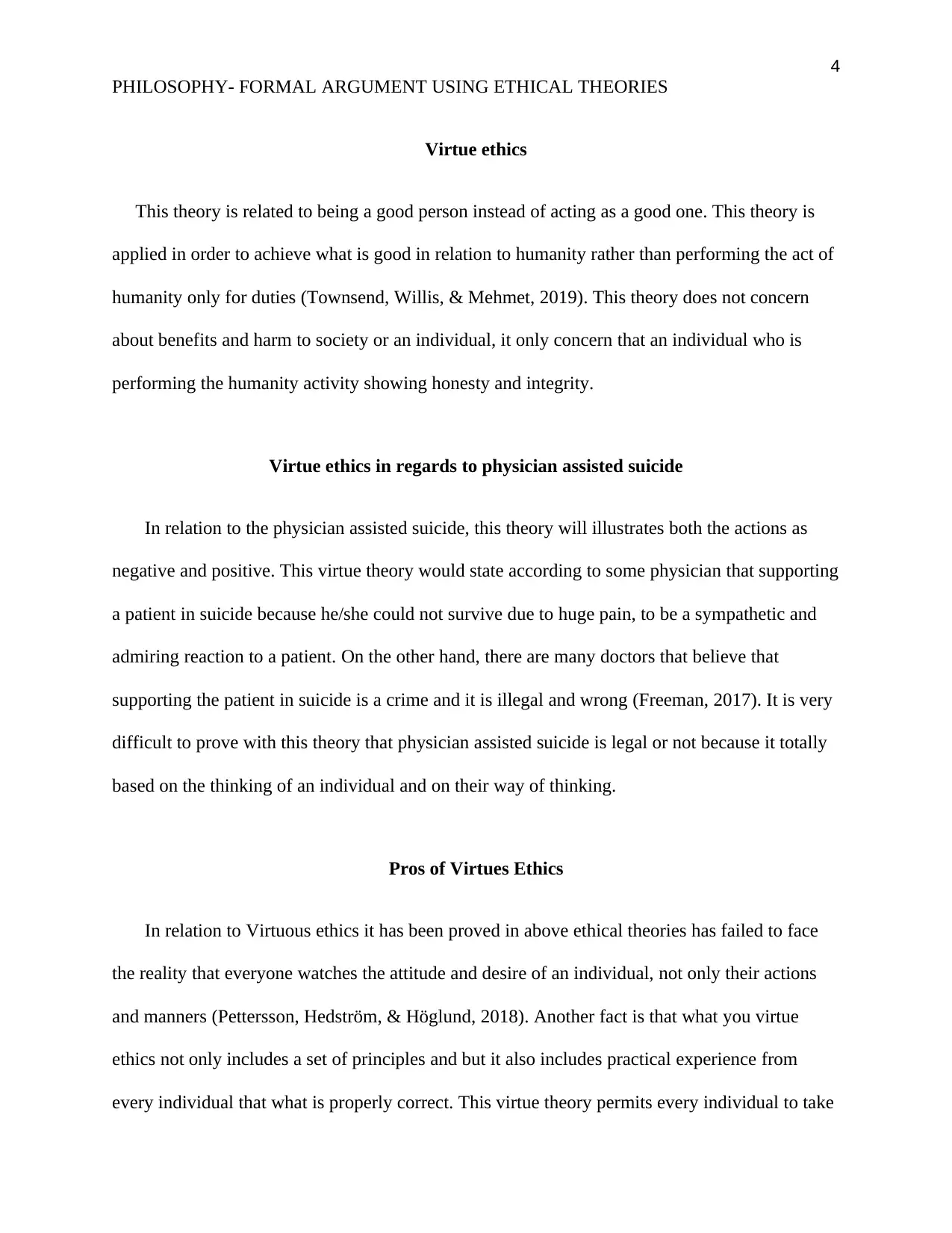
4
PHILOSOPHY- FORMAL ARGUMENT USING ETHICAL THEORIES
Virtue ethics
This theory is related to being a good person instead of acting as a good one. This theory is
applied in order to achieve what is good in relation to humanity rather than performing the act of
humanity only for duties (Townsend, Willis, & Mehmet, 2019). This theory does not concern
about benefits and harm to society or an individual, it only concern that an individual who is
performing the humanity activity showing honesty and integrity.
Virtue ethics in regards to physician assisted suicide
In relation to the physician assisted suicide, this theory will illustrates both the actions as
negative and positive. This virtue theory would state according to some physician that supporting
a patient in suicide because he/she could not survive due to huge pain, to be a sympathetic and
admiring reaction to a patient. On the other hand, there are many doctors that believe that
supporting the patient in suicide is a crime and it is illegal and wrong (Freeman, 2017). It is very
difficult to prove with this theory that physician assisted suicide is legal or not because it totally
based on the thinking of an individual and on their way of thinking.
Pros of Virtues Ethics
In relation to Virtuous ethics it has been proved in above ethical theories has failed to face
the reality that everyone watches the attitude and desire of an individual, not only their actions
and manners (Pettersson, Hedström, & Höglund, 2018). Another fact is that what you virtue
ethics not only includes a set of principles and but it also includes practical experience from
every individual that what is properly correct. This virtue theory permits every individual to take
PHILOSOPHY- FORMAL ARGUMENT USING ETHICAL THEORIES
Virtue ethics
This theory is related to being a good person instead of acting as a good one. This theory is
applied in order to achieve what is good in relation to humanity rather than performing the act of
humanity only for duties (Townsend, Willis, & Mehmet, 2019). This theory does not concern
about benefits and harm to society or an individual, it only concern that an individual who is
performing the humanity activity showing honesty and integrity.
Virtue ethics in regards to physician assisted suicide
In relation to the physician assisted suicide, this theory will illustrates both the actions as
negative and positive. This virtue theory would state according to some physician that supporting
a patient in suicide because he/she could not survive due to huge pain, to be a sympathetic and
admiring reaction to a patient. On the other hand, there are many doctors that believe that
supporting the patient in suicide is a crime and it is illegal and wrong (Freeman, 2017). It is very
difficult to prove with this theory that physician assisted suicide is legal or not because it totally
based on the thinking of an individual and on their way of thinking.
Pros of Virtues Ethics
In relation to Virtuous ethics it has been proved in above ethical theories has failed to face
the reality that everyone watches the attitude and desire of an individual, not only their actions
and manners (Pettersson, Hedström, & Höglund, 2018). Another fact is that what you virtue
ethics not only includes a set of principles and but it also includes practical experience from
every individual that what is properly correct. This virtue theory permits every individual to take
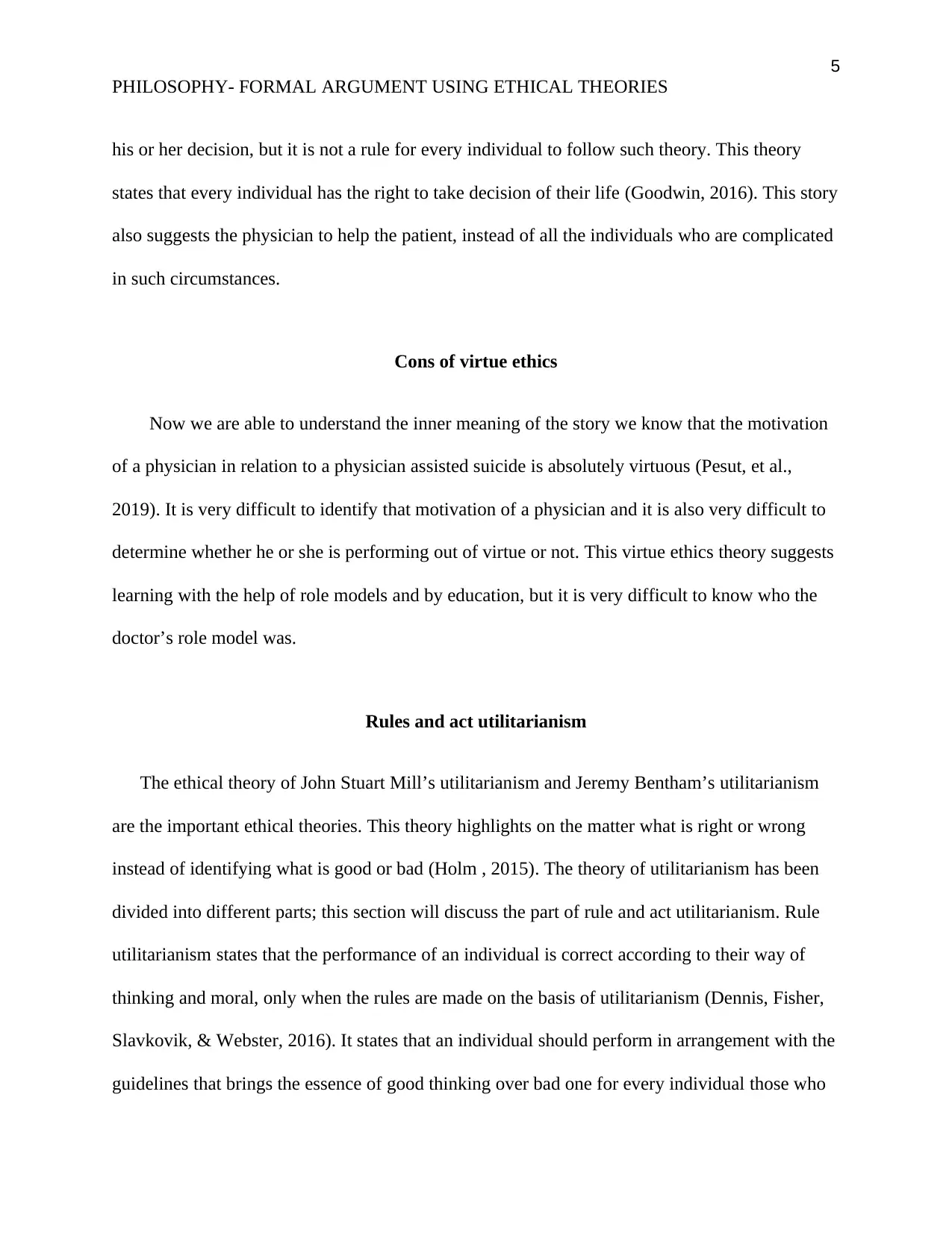
5
PHILOSOPHY- FORMAL ARGUMENT USING ETHICAL THEORIES
his or her decision, but it is not a rule for every individual to follow such theory. This theory
states that every individual has the right to take decision of their life (Goodwin, 2016). This story
also suggests the physician to help the patient, instead of all the individuals who are complicated
in such circumstances.
Cons of virtue ethics
Now we are able to understand the inner meaning of the story we know that the motivation
of a physician in relation to a physician assisted suicide is absolutely virtuous (Pesut, et al.,
2019). It is very difficult to identify that motivation of a physician and it is also very difficult to
determine whether he or she is performing out of virtue or not. This virtue ethics theory suggests
learning with the help of role models and by education, but it is very difficult to know who the
doctor’s role model was.
Rules and act utilitarianism
The ethical theory of John Stuart Mill’s utilitarianism and Jeremy Bentham’s utilitarianism
are the important ethical theories. This theory highlights on the matter what is right or wrong
instead of identifying what is good or bad (Holm , 2015). The theory of utilitarianism has been
divided into different parts; this section will discuss the part of rule and act utilitarianism. Rule
utilitarianism states that the performance of an individual is correct according to their way of
thinking and moral, only when the rules are made on the basis of utilitarianism (Dennis, Fisher,
Slavkovik, & Webster, 2016). It states that an individual should perform in arrangement with the
guidelines that brings the essence of good thinking over bad one for every individual those who
PHILOSOPHY- FORMAL ARGUMENT USING ETHICAL THEORIES
his or her decision, but it is not a rule for every individual to follow such theory. This theory
states that every individual has the right to take decision of their life (Goodwin, 2016). This story
also suggests the physician to help the patient, instead of all the individuals who are complicated
in such circumstances.
Cons of virtue ethics
Now we are able to understand the inner meaning of the story we know that the motivation
of a physician in relation to a physician assisted suicide is absolutely virtuous (Pesut, et al.,
2019). It is very difficult to identify that motivation of a physician and it is also very difficult to
determine whether he or she is performing out of virtue or not. This virtue ethics theory suggests
learning with the help of role models and by education, but it is very difficult to know who the
doctor’s role model was.
Rules and act utilitarianism
The ethical theory of John Stuart Mill’s utilitarianism and Jeremy Bentham’s utilitarianism
are the important ethical theories. This theory highlights on the matter what is right or wrong
instead of identifying what is good or bad (Holm , 2015). The theory of utilitarianism has been
divided into different parts; this section will discuss the part of rule and act utilitarianism. Rule
utilitarianism states that the performance of an individual is correct according to their way of
thinking and moral, only when the rules are made on the basis of utilitarianism (Dennis, Fisher,
Slavkovik, & Webster, 2016). It states that an individual should perform in arrangement with the
guidelines that brings the essence of good thinking over bad one for every individual those who
⊘ This is a preview!⊘
Do you want full access?
Subscribe today to unlock all pages.

Trusted by 1+ million students worldwide
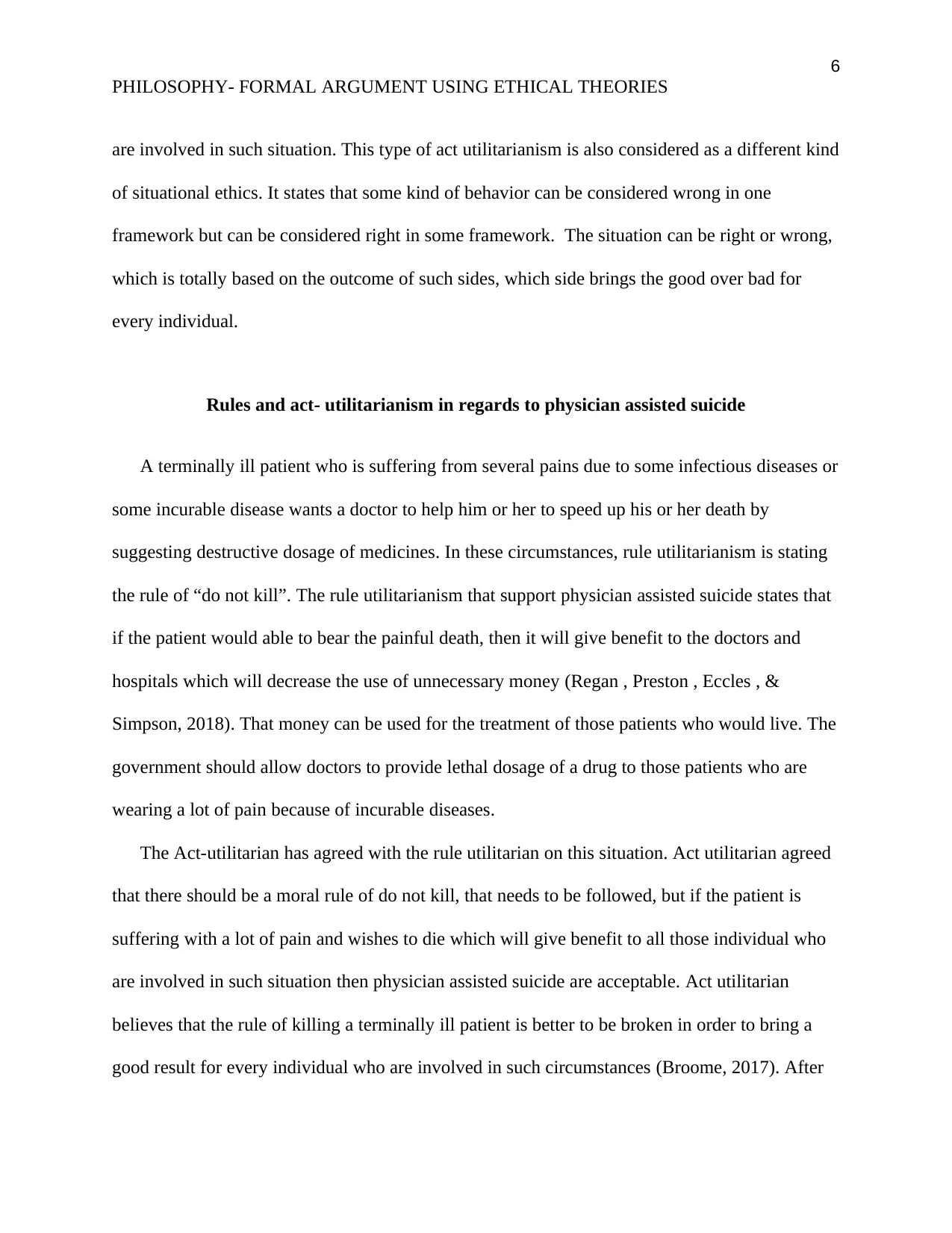
6
PHILOSOPHY- FORMAL ARGUMENT USING ETHICAL THEORIES
are involved in such situation. This type of act utilitarianism is also considered as a different kind
of situational ethics. It states that some kind of behavior can be considered wrong in one
framework but can be considered right in some framework. The situation can be right or wrong,
which is totally based on the outcome of such sides, which side brings the good over bad for
every individual.
Rules and act- utilitarianism in regards to physician assisted suicide
A terminally ill patient who is suffering from several pains due to some infectious diseases or
some incurable disease wants a doctor to help him or her to speed up his or her death by
suggesting destructive dosage of medicines. In these circumstances, rule utilitarianism is stating
the rule of “do not kill”. The rule utilitarianism that support physician assisted suicide states that
if the patient would able to bear the painful death, then it will give benefit to the doctors and
hospitals which will decrease the use of unnecessary money (Regan , Preston , Eccles , &
Simpson, 2018). That money can be used for the treatment of those patients who would live. The
government should allow doctors to provide lethal dosage of a drug to those patients who are
wearing a lot of pain because of incurable diseases.
The Act-utilitarian has agreed with the rule utilitarian on this situation. Act utilitarian agreed
that there should be a moral rule of do not kill, that needs to be followed, but if the patient is
suffering with a lot of pain and wishes to die which will give benefit to all those individual who
are involved in such situation then physician assisted suicide are acceptable. Act utilitarian
believes that the rule of killing a terminally ill patient is better to be broken in order to bring a
good result for every individual who are involved in such circumstances (Broome, 2017). After
PHILOSOPHY- FORMAL ARGUMENT USING ETHICAL THEORIES
are involved in such situation. This type of act utilitarianism is also considered as a different kind
of situational ethics. It states that some kind of behavior can be considered wrong in one
framework but can be considered right in some framework. The situation can be right or wrong,
which is totally based on the outcome of such sides, which side brings the good over bad for
every individual.
Rules and act- utilitarianism in regards to physician assisted suicide
A terminally ill patient who is suffering from several pains due to some infectious diseases or
some incurable disease wants a doctor to help him or her to speed up his or her death by
suggesting destructive dosage of medicines. In these circumstances, rule utilitarianism is stating
the rule of “do not kill”. The rule utilitarianism that support physician assisted suicide states that
if the patient would able to bear the painful death, then it will give benefit to the doctors and
hospitals which will decrease the use of unnecessary money (Regan , Preston , Eccles , &
Simpson, 2018). That money can be used for the treatment of those patients who would live. The
government should allow doctors to provide lethal dosage of a drug to those patients who are
wearing a lot of pain because of incurable diseases.
The Act-utilitarian has agreed with the rule utilitarian on this situation. Act utilitarian agreed
that there should be a moral rule of do not kill, that needs to be followed, but if the patient is
suffering with a lot of pain and wishes to die which will give benefit to all those individual who
are involved in such situation then physician assisted suicide are acceptable. Act utilitarian
believes that the rule of killing a terminally ill patient is better to be broken in order to bring a
good result for every individual who are involved in such circumstances (Broome, 2017). After
Paraphrase This Document
Need a fresh take? Get an instant paraphrase of this document with our AI Paraphraser
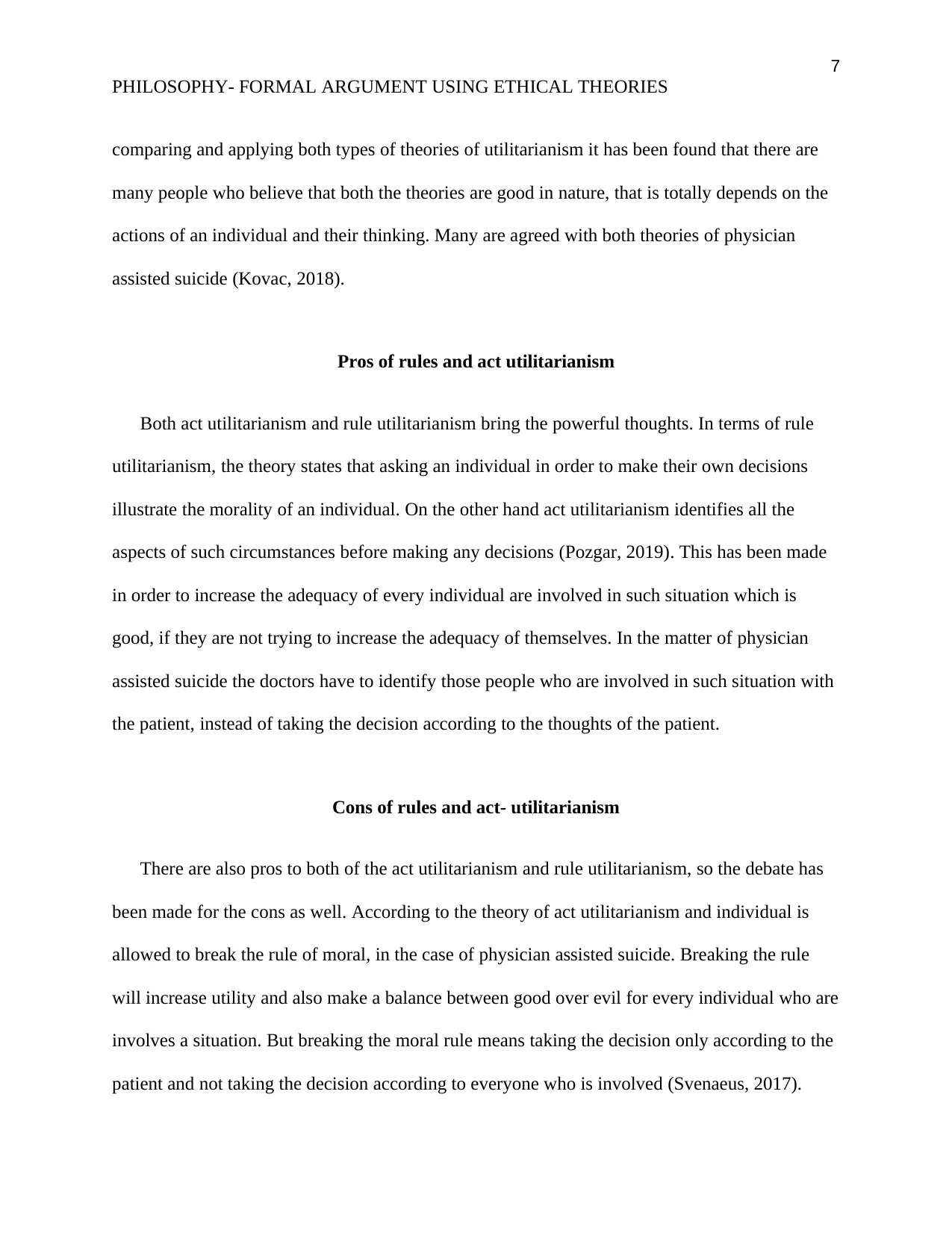
7
PHILOSOPHY- FORMAL ARGUMENT USING ETHICAL THEORIES
comparing and applying both types of theories of utilitarianism it has been found that there are
many people who believe that both the theories are good in nature, that is totally depends on the
actions of an individual and their thinking. Many are agreed with both theories of physician
assisted suicide (Kovac, 2018).
Pros of rules and act utilitarianism
Both act utilitarianism and rule utilitarianism bring the powerful thoughts. In terms of rule
utilitarianism, the theory states that asking an individual in order to make their own decisions
illustrate the morality of an individual. On the other hand act utilitarianism identifies all the
aspects of such circumstances before making any decisions (Pozgar, 2019). This has been made
in order to increase the adequacy of every individual are involved in such situation which is
good, if they are not trying to increase the adequacy of themselves. In the matter of physician
assisted suicide the doctors have to identify those people who are involved in such situation with
the patient, instead of taking the decision according to the thoughts of the patient.
Cons of rules and act- utilitarianism
There are also pros to both of the act utilitarianism and rule utilitarianism, so the debate has
been made for the cons as well. According to the theory of act utilitarianism and individual is
allowed to break the rule of moral, in the case of physician assisted suicide. Breaking the rule
will increase utility and also make a balance between good over evil for every individual who are
involves a situation. But breaking the moral rule means taking the decision only according to the
patient and not taking the decision according to everyone who is involved (Svenaeus, 2017).
PHILOSOPHY- FORMAL ARGUMENT USING ETHICAL THEORIES
comparing and applying both types of theories of utilitarianism it has been found that there are
many people who believe that both the theories are good in nature, that is totally depends on the
actions of an individual and their thinking. Many are agreed with both theories of physician
assisted suicide (Kovac, 2018).
Pros of rules and act utilitarianism
Both act utilitarianism and rule utilitarianism bring the powerful thoughts. In terms of rule
utilitarianism, the theory states that asking an individual in order to make their own decisions
illustrate the morality of an individual. On the other hand act utilitarianism identifies all the
aspects of such circumstances before making any decisions (Pozgar, 2019). This has been made
in order to increase the adequacy of every individual are involved in such situation which is
good, if they are not trying to increase the adequacy of themselves. In the matter of physician
assisted suicide the doctors have to identify those people who are involved in such situation with
the patient, instead of taking the decision according to the thoughts of the patient.
Cons of rules and act- utilitarianism
There are also pros to both of the act utilitarianism and rule utilitarianism, so the debate has
been made for the cons as well. According to the theory of act utilitarianism and individual is
allowed to break the rule of moral, in the case of physician assisted suicide. Breaking the rule
will increase utility and also make a balance between good over evil for every individual who are
involves a situation. But breaking the moral rule means taking the decision only according to the
patient and not taking the decision according to everyone who is involved (Svenaeus, 2017).
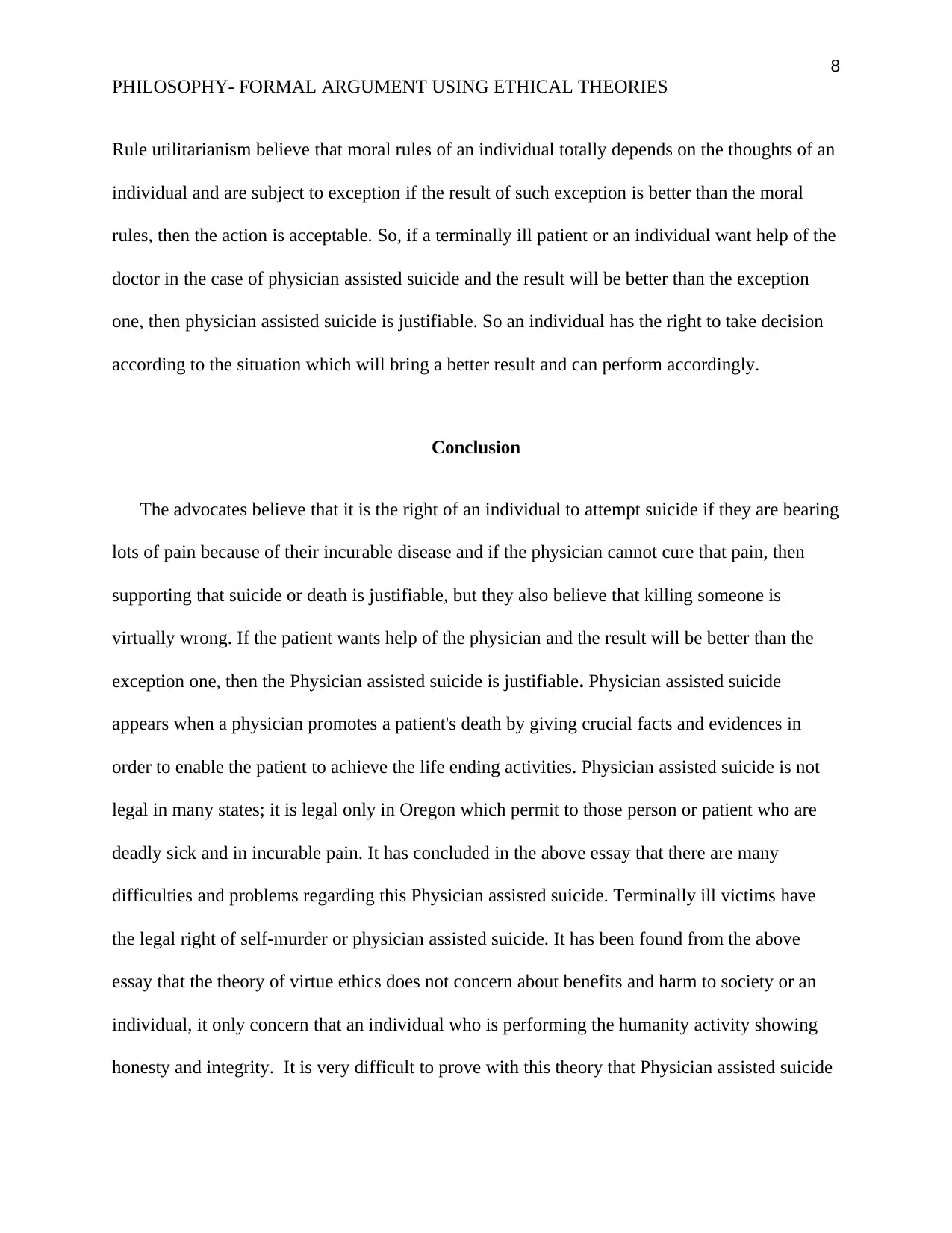
8
PHILOSOPHY- FORMAL ARGUMENT USING ETHICAL THEORIES
Rule utilitarianism believe that moral rules of an individual totally depends on the thoughts of an
individual and are subject to exception if the result of such exception is better than the moral
rules, then the action is acceptable. So, if a terminally ill patient or an individual want help of the
doctor in the case of physician assisted suicide and the result will be better than the exception
one, then physician assisted suicide is justifiable. So an individual has the right to take decision
according to the situation which will bring a better result and can perform accordingly.
Conclusion
The advocates believe that it is the right of an individual to attempt suicide if they are bearing
lots of pain because of their incurable disease and if the physician cannot cure that pain, then
supporting that suicide or death is justifiable, but they also believe that killing someone is
virtually wrong. If the patient wants help of the physician and the result will be better than the
exception one, then the Physician assisted suicide is justifiable. Physician assisted suicide
appears when a physician promotes a patient's death by giving crucial facts and evidences in
order to enable the patient to achieve the life ending activities. Physician assisted suicide is not
legal in many states; it is legal only in Oregon which permit to those person or patient who are
deadly sick and in incurable pain. It has concluded in the above essay that there are many
difficulties and problems regarding this Physician assisted suicide. Terminally ill victims have
the legal right of self-murder or physician assisted suicide. It has been found from the above
essay that the theory of virtue ethics does not concern about benefits and harm to society or an
individual, it only concern that an individual who is performing the humanity activity showing
honesty and integrity. It is very difficult to prove with this theory that Physician assisted suicide
PHILOSOPHY- FORMAL ARGUMENT USING ETHICAL THEORIES
Rule utilitarianism believe that moral rules of an individual totally depends on the thoughts of an
individual and are subject to exception if the result of such exception is better than the moral
rules, then the action is acceptable. So, if a terminally ill patient or an individual want help of the
doctor in the case of physician assisted suicide and the result will be better than the exception
one, then physician assisted suicide is justifiable. So an individual has the right to take decision
according to the situation which will bring a better result and can perform accordingly.
Conclusion
The advocates believe that it is the right of an individual to attempt suicide if they are bearing
lots of pain because of their incurable disease and if the physician cannot cure that pain, then
supporting that suicide or death is justifiable, but they also believe that killing someone is
virtually wrong. If the patient wants help of the physician and the result will be better than the
exception one, then the Physician assisted suicide is justifiable. Physician assisted suicide
appears when a physician promotes a patient's death by giving crucial facts and evidences in
order to enable the patient to achieve the life ending activities. Physician assisted suicide is not
legal in many states; it is legal only in Oregon which permit to those person or patient who are
deadly sick and in incurable pain. It has concluded in the above essay that there are many
difficulties and problems regarding this Physician assisted suicide. Terminally ill victims have
the legal right of self-murder or physician assisted suicide. It has been found from the above
essay that the theory of virtue ethics does not concern about benefits and harm to society or an
individual, it only concern that an individual who is performing the humanity activity showing
honesty and integrity. It is very difficult to prove with this theory that Physician assisted suicide
⊘ This is a preview!⊘
Do you want full access?
Subscribe today to unlock all pages.

Trusted by 1+ million students worldwide
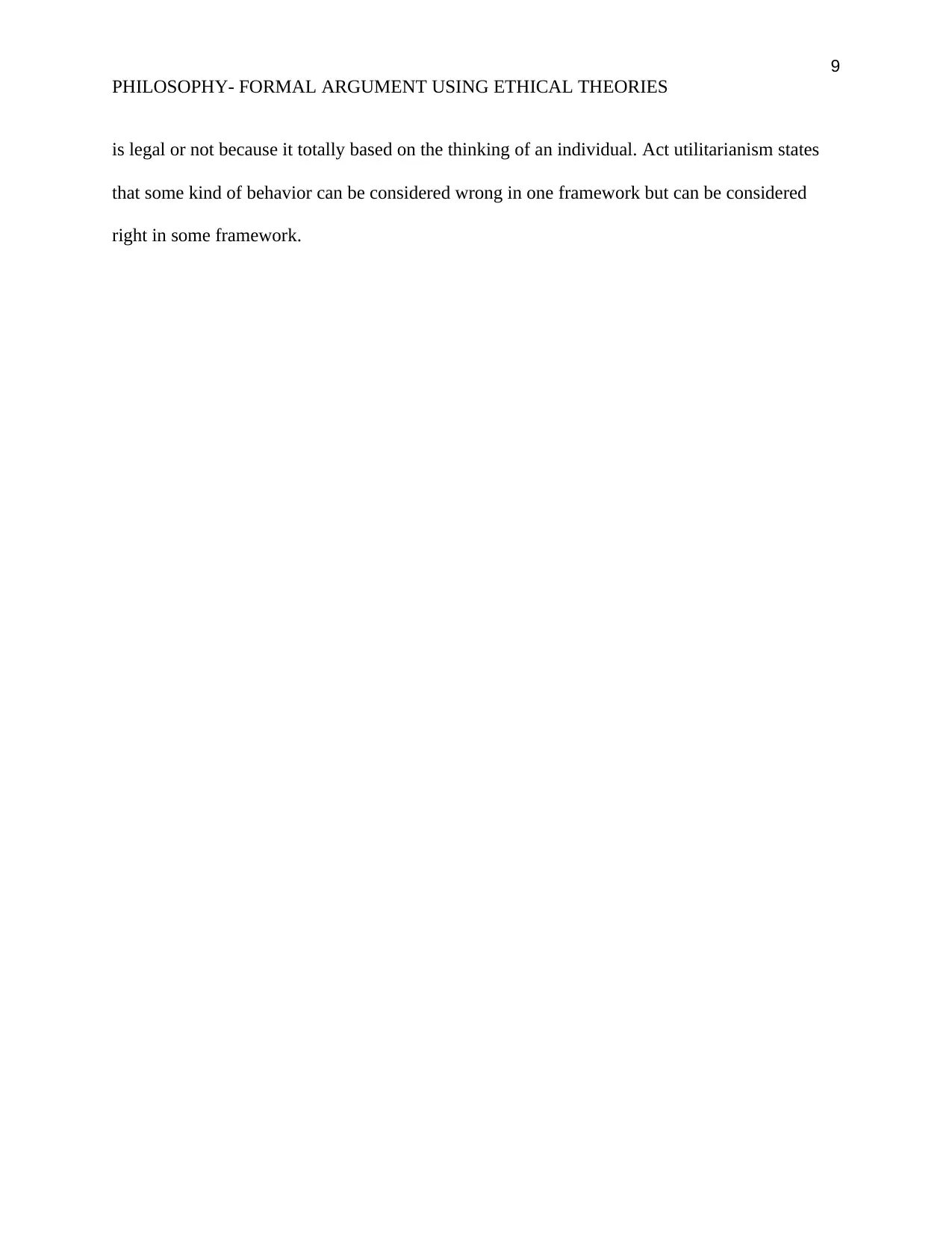
9
PHILOSOPHY- FORMAL ARGUMENT USING ETHICAL THEORIES
is legal or not because it totally based on the thinking of an individual. Act utilitarianism states
that some kind of behavior can be considered wrong in one framework but can be considered
right in some framework.
PHILOSOPHY- FORMAL ARGUMENT USING ETHICAL THEORIES
is legal or not because it totally based on the thinking of an individual. Act utilitarianism states
that some kind of behavior can be considered wrong in one framework but can be considered
right in some framework.
Paraphrase This Document
Need a fresh take? Get an instant paraphrase of this document with our AI Paraphraser
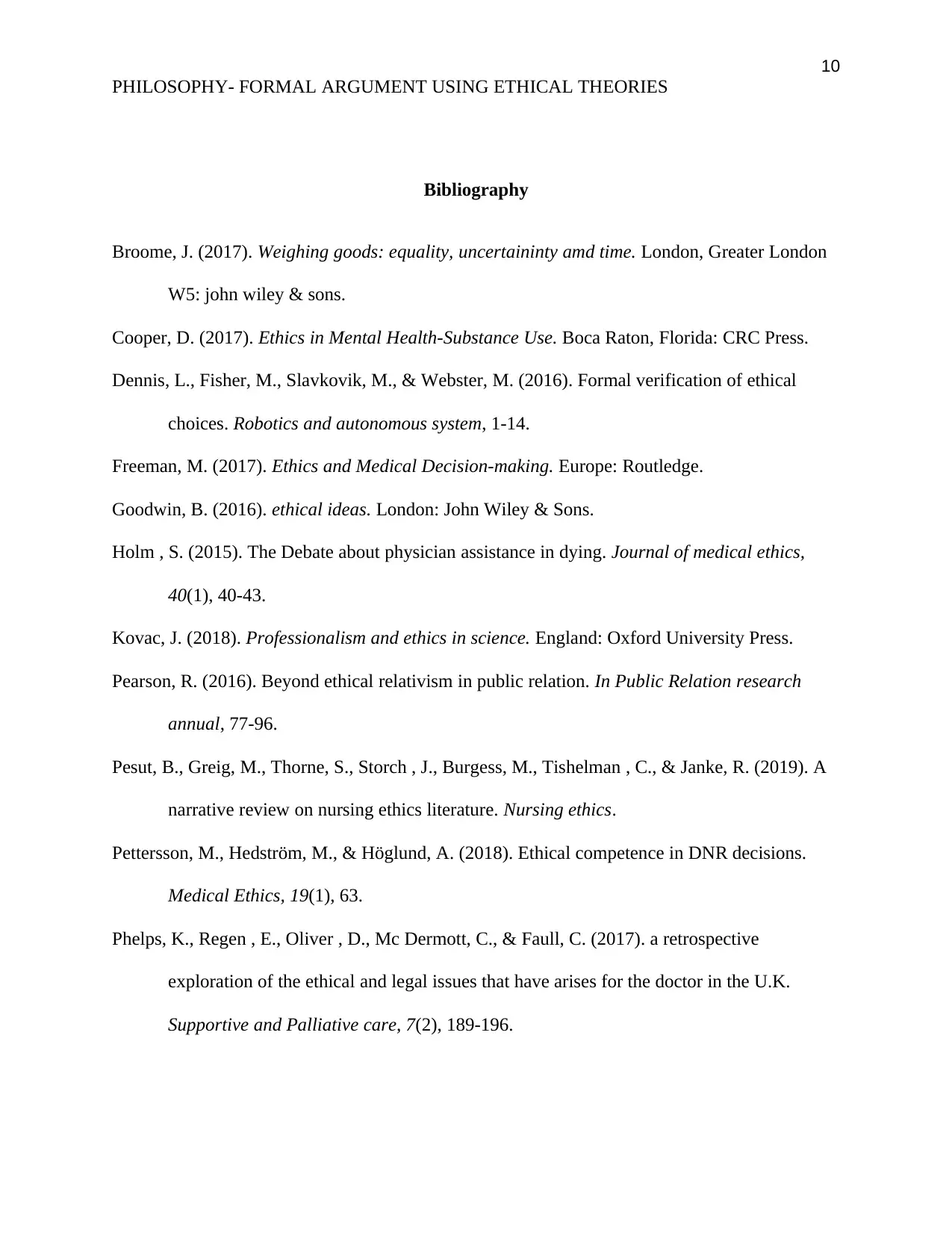
10
PHILOSOPHY- FORMAL ARGUMENT USING ETHICAL THEORIES
Bibliography
Broome, J. (2017). Weighing goods: equality, uncertaininty amd time. London, Greater London
W5: john wiley & sons.
Cooper, D. (2017). Ethics in Mental Health-Substance Use. Boca Raton, Florida: CRC Press.
Dennis, L., Fisher, M., Slavkovik, M., & Webster, M. (2016). Formal verification of ethical
choices. Robotics and autonomous system, 1-14.
Freeman, M. (2017). Ethics and Medical Decision-making. Europe: Routledge.
Goodwin, B. (2016). ethical ideas. London: John Wiley & Sons.
Holm , S. (2015). The Debate about physician assistance in dying. Journal of medical ethics,
40(1), 40-43.
Kovac, J. (2018). Professionalism and ethics in science. England: Oxford University Press.
Pearson, R. (2016). Beyond ethical relativism in public relation. In Public Relation research
annual, 77-96.
Pesut, B., Greig, M., Thorne, S., Storch , J., Burgess, M., Tishelman , C., & Janke, R. (2019). A
narrative review on nursing ethics literature. Nursing ethics.
Pettersson, M., Hedström, M., & Höglund, A. (2018). Ethical competence in DNR decisions.
Medical Ethics, 19(1), 63.
Phelps, K., Regen , E., Oliver , D., Mc Dermott, C., & Faull, C. (2017). a retrospective
exploration of the ethical and legal issues that have arises for the doctor in the U.K.
Supportive and Palliative care, 7(2), 189-196.
PHILOSOPHY- FORMAL ARGUMENT USING ETHICAL THEORIES
Bibliography
Broome, J. (2017). Weighing goods: equality, uncertaininty amd time. London, Greater London
W5: john wiley & sons.
Cooper, D. (2017). Ethics in Mental Health-Substance Use. Boca Raton, Florida: CRC Press.
Dennis, L., Fisher, M., Slavkovik, M., & Webster, M. (2016). Formal verification of ethical
choices. Robotics and autonomous system, 1-14.
Freeman, M. (2017). Ethics and Medical Decision-making. Europe: Routledge.
Goodwin, B. (2016). ethical ideas. London: John Wiley & Sons.
Holm , S. (2015). The Debate about physician assistance in dying. Journal of medical ethics,
40(1), 40-43.
Kovac, J. (2018). Professionalism and ethics in science. England: Oxford University Press.
Pearson, R. (2016). Beyond ethical relativism in public relation. In Public Relation research
annual, 77-96.
Pesut, B., Greig, M., Thorne, S., Storch , J., Burgess, M., Tishelman , C., & Janke, R. (2019). A
narrative review on nursing ethics literature. Nursing ethics.
Pettersson, M., Hedström, M., & Höglund, A. (2018). Ethical competence in DNR decisions.
Medical Ethics, 19(1), 63.
Phelps, K., Regen , E., Oliver , D., Mc Dermott, C., & Faull, C. (2017). a retrospective
exploration of the ethical and legal issues that have arises for the doctor in the U.K.
Supportive and Palliative care, 7(2), 189-196.
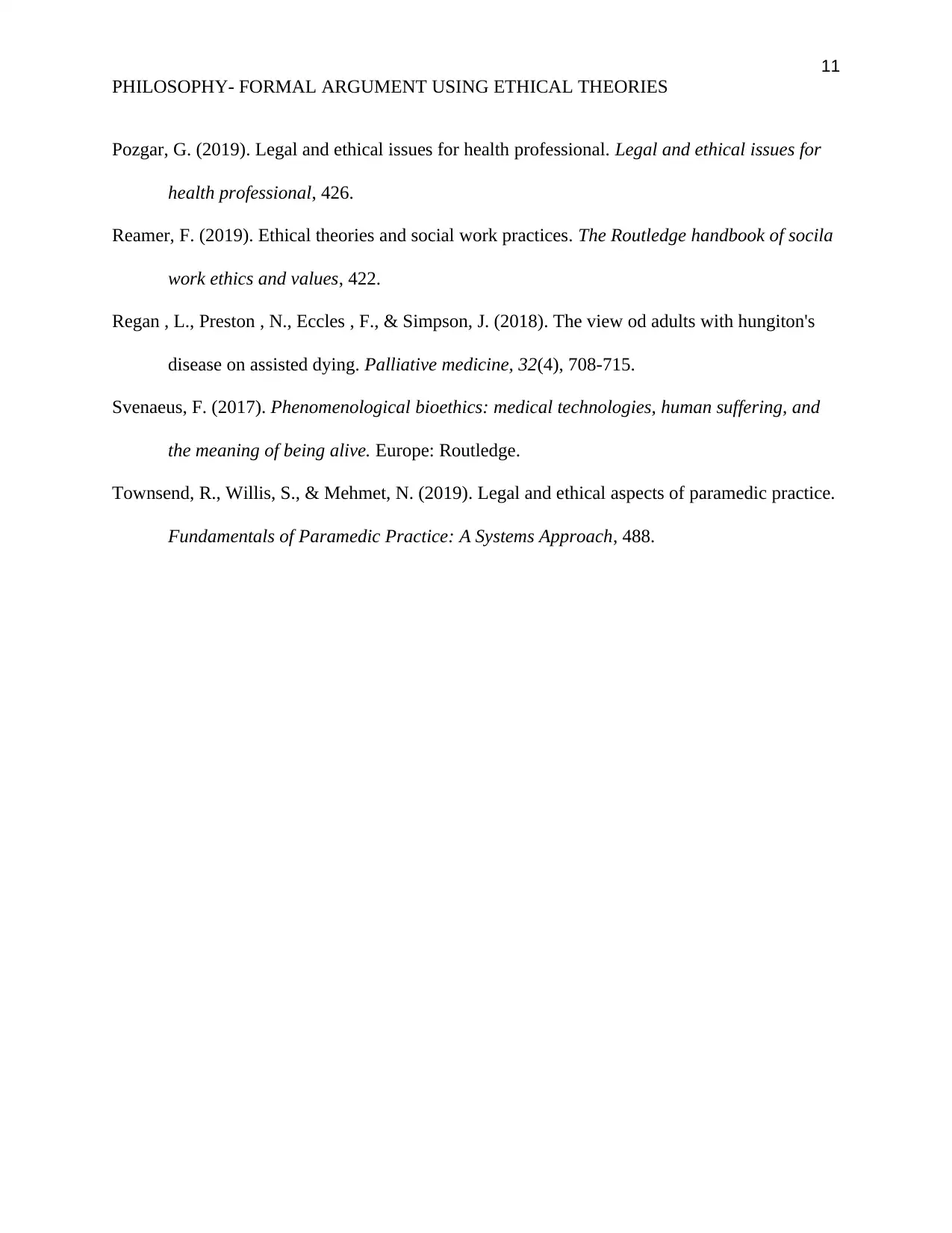
11
PHILOSOPHY- FORMAL ARGUMENT USING ETHICAL THEORIES
Pozgar, G. (2019). Legal and ethical issues for health professional. Legal and ethical issues for
health professional, 426.
Reamer, F. (2019). Ethical theories and social work practices. The Routledge handbook of socila
work ethics and values, 422.
Regan , L., Preston , N., Eccles , F., & Simpson, J. (2018). The view od adults with hungiton's
disease on assisted dying. Palliative medicine, 32(4), 708-715.
Svenaeus, F. (2017). Phenomenological bioethics: medical technologies, human suffering, and
the meaning of being alive. Europe: Routledge.
Townsend, R., Willis, S., & Mehmet, N. (2019). Legal and ethical aspects of paramedic practice.
Fundamentals of Paramedic Practice: A Systems Approach, 488.
PHILOSOPHY- FORMAL ARGUMENT USING ETHICAL THEORIES
Pozgar, G. (2019). Legal and ethical issues for health professional. Legal and ethical issues for
health professional, 426.
Reamer, F. (2019). Ethical theories and social work practices. The Routledge handbook of socila
work ethics and values, 422.
Regan , L., Preston , N., Eccles , F., & Simpson, J. (2018). The view od adults with hungiton's
disease on assisted dying. Palliative medicine, 32(4), 708-715.
Svenaeus, F. (2017). Phenomenological bioethics: medical technologies, human suffering, and
the meaning of being alive. Europe: Routledge.
Townsend, R., Willis, S., & Mehmet, N. (2019). Legal and ethical aspects of paramedic practice.
Fundamentals of Paramedic Practice: A Systems Approach, 488.
⊘ This is a preview!⊘
Do you want full access?
Subscribe today to unlock all pages.

Trusted by 1+ million students worldwide
1 out of 12
Related Documents
Your All-in-One AI-Powered Toolkit for Academic Success.
+13062052269
info@desklib.com
Available 24*7 on WhatsApp / Email
![[object Object]](/_next/static/media/star-bottom.7253800d.svg)
Unlock your academic potential
Copyright © 2020–2026 A2Z Services. All Rights Reserved. Developed and managed by ZUCOL.




